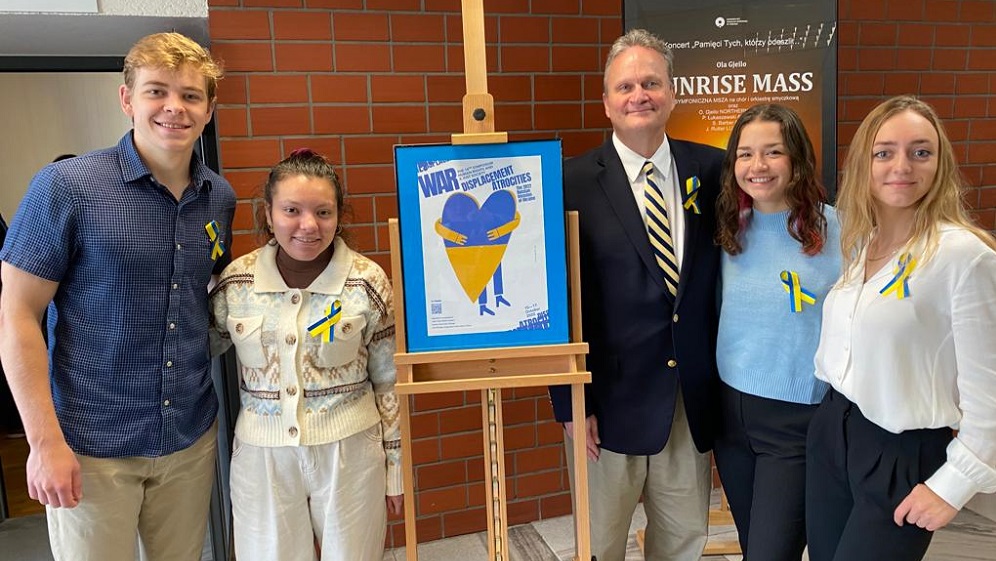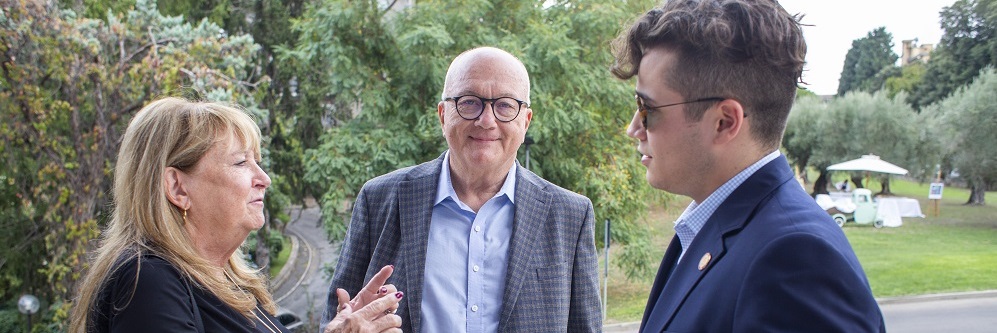
I am a son of Poland
Human Rights
I am a son of Poland
Alum looks back over the 14 editions of the study tour he created
Story by John Kurowski - Photos by Lukas Keapproth and John Kurowski
JFRC Class 1973-74 alum, John Kurowski looks at the history of the trip he created in 2006 for JFRC students at Nicolaus Copernicus University in Torun, Poland. After almost a decade and half of running this educational excursion, this year’s trip marked a new chapter in studying human rights as Poland currently is home to an estimated 3 million Ukrainian refugees from the war.
Returning to the homeland
I am a son of Poland. In the early part of the 20th century, my grandparents immigrated to East St. Louis, Illinois from Poland so I was raised in Polish culture and traditions. As a Rome Center student in 1973, I naturally gravitated to participate in the study tour to the Soviet Union and Poland in the spring of 1974. On that 17-day journey, I was able to identify and spend a day with my father’s first cousin and his family. This would be the first of more than 25 trips to Poland.
Into the 1980s, as Poland entered a dark and difficult period, I lost touch with my native land: I married, had children and started a law practice.
However, in early 2005 – Poland now a free and democratic nation – I was selected as a Visiting Professor of Law at Nicolaus Copernicus University (NCU) School of Law and Administration in Torun for the fall of 2006. Shortly after, my son Joe decided to spend the year at the JFRC. A couple years earlier, I had reconnected with the Rome Center’s founder John Felice and began to think about a way to connect my future Polish students with JFRC students for a mutually beneficial experience.
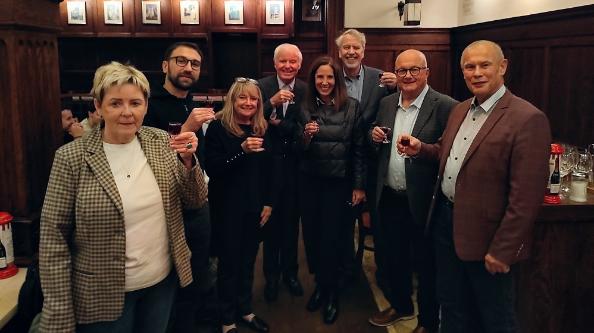
Study tour group from October 2022, with John Kurowski (second from right), his cousin Andrzej Kurowski (far right)
Birth of the JFRC study trip to Poland
As a lawyer for almost 30 years, I had seen and done so much that my interests went far beyond my civil litigation practice. That summer I had spent a week in a seminar on human rights in a just society at the Aspen Institute. I had always had a keen interest in government, politics and social justice issues. By a stroke of luck, my sponsors at Copernicus were the leadership of the faculty for Human Rights at the law school. They quickly embraced my idea of American students coming to Torun at their Thanksgiving break and suggested a human rights related program. The JFRC did as well, and 11 students (including son Joe and two sons of my JFRC classmates) joined my 32 students.
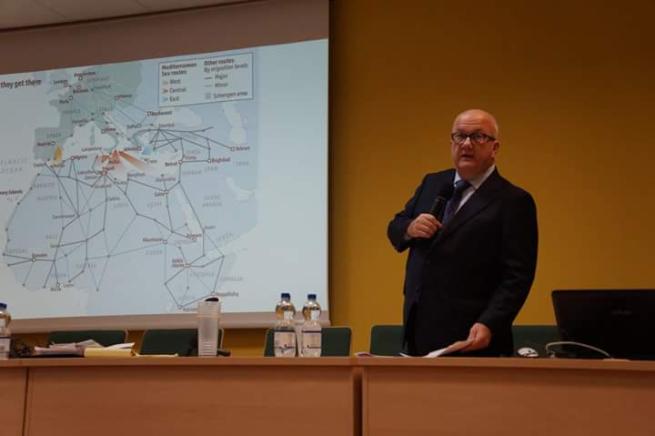
Kurowski gives lecture in Torun during Study Trip 2015
I returned from my seven weeks in Poland pleased with my experience, including the time I had shared with JFRC students and my students. I was surprised in March 2007, when Todd Waller, then JFRC Dean of Students and Human Rights instructor, called me and asked if I would be willing to repeat the trip for JFRC students at their fall break and expand the content. The rest is history.
During the study trips "We tackled some compelling subjects: Human trafficking; the twentieth anniversary of the Rwanda genocide, crimes against humanity and the international justice system; and women’s’ right in a just society" John Kurowski, Class of 1973-1974
Trip grows and students meet with activists, scholars and lawyers
Twelve programs followed between 2007 and 2018, with my Polish colleagues always offering great resources and planning. Dr. Waller usually assisted with the planning and often came along. We tackled some compelling subjects: Human trafficking; the twentieth anniversary of the Rwanda genocide, crimes against humanity and the international justice system; and women’s’ right in a just society.
Peter J. Schraeder, Dean College of Arts and Sciences, with students during Study Trip 2022
Students heard from both scholars and activists including: a woman who ran a shelter for victims of human trafficking in Romania; a Seventh Day Adventist minister who was the only American who stayed behind during the Rwanda genocide; an Afghan refugee who made the dangerous trek across several Middle Eastern countries to find his way to freedom in Italy. We also conducted mock asylum trials and heard of the unearthing of human atrocities by courageous Human Rights Watch researchers.
In 2010, JFRC Director Emilio Iodice expanded the program to include a weeklong stay in Poland to experience more of its dramatic history including the Holocaust and WWII. I consistently told our students that post-1989 Poland was a “great story” and how Poland was enjoying the longest period of peace in its 1000-year history.
Russia’s invasion of Ukraine on February 24, 2022 changed all that.
"Stories of atrocities were emerging from places like Bucha and Irpin.... there was no end in sight for the war. To enhance the planning I decided to travel to Poland in May, 2022 to see and touch many of the participants" John Kurowski, Class of 1973-1974
Human rights scope focuses on war in Ukraine
While vetting topics for the return of the symposium after a three-year COVID hiatus it quickly became clear that the war in the Ukraine must be our focus. Over one million refugees were now streaming across the Polish border. Russian rockets and artillery were devastating Ukrainian cities. The southern port city of Mariupol was being destroyed reminiscent of Warsaw in World War II. Stories of atrocities were emerging from places like Bucha and Irpin. Although the Ukrainians had begun to have some success repelling the invasion there was no end in sight for the war. To enhance the planning I decided to travel to Poland in May, 2022 to see and touch many of the participants.
When we began planning, we thought there would be refugee camps throughout Poland and other countries. There was none. The response of Poles to their Ukrainian neighbors was overwhelming. People stayed in homes and various shelters. Poland became one big NGO, helping to find the way for Ukrainian refugees.
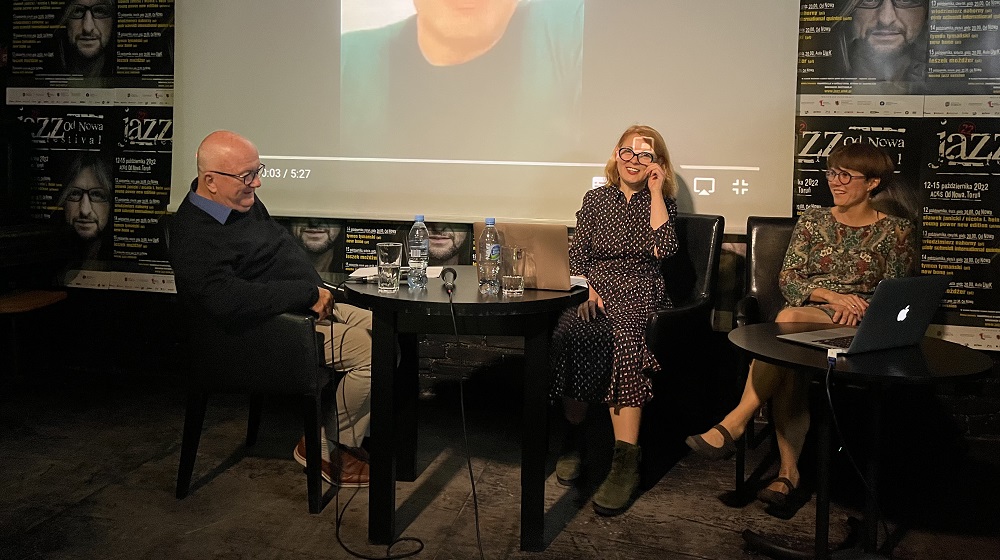
Kurowski with Judge Tetyana Antsupova (middle) and NCU law professor Julia Kapelanska (right) in 2022
I visited two humanitarian relief centers in Torun. I spoke to Tatiana Dembska, a Ukrainian living in Poland about her efforts to feed and save people. I visited and spoke to Ukrainian children at an orphanage in Warsaw. I visited the Camillian Fathers sanctuary in Warsaw where they were housing over 30 Ukrainian women and children. I heard the story of a young Ukrainian mother of two, Marika Gvagvaliia, about how she made the difficult decision to leave her homeland and Kyiv, while her husband remained. I was able to spend time with my friend, Polish journalist Maciej Wierzynski and his wife Ewa in Warsaw.
"Some have escaped. Some remain. Some have died. Some have been taken against their will to Russia” Tetyana Antsupova, Ukrainian Supreme Court Justice
I met and connected with Ukrainian Supreme Court Justice, Tetyana Antsupova of Kyiv through my colleagues at Copernicus. Like me, she had spent time as a Visiting Professor there. Born in Mariupol she left there to attend law school at the University of Odesa where she later became a leading human rights professor until she became a judge in 2017. She also made the difficult decision to flee the shelling and bombing. She traveled by car from Kyiv to Torun with her 15 year old son in the dead of winter, sleeping in their car in the cold and battling fuel shortages. Until recently she has been going back and forth to Kyiv to perform her judicial duties. I was very curious about her home town of Mariupol and the fate of relatives and friends there given the devastation. She told me, “…Some have escaped. Some remain. Some have died. Some have been taken against their will to Russia.”
A 'different' symposium
Gvagvaliia, Dempska and Antsupova all agreed to speak at the symposium. They all quickly captured the undivided attention of the participants. Each of them demonstrated the continuing unflinching drive of the Ukrainian people to overcome this war.
This symposium was different. We were able to touch and feel the human impact of an unjust war and its human devastation. It affected me personally. The thoughts of one of the Chicago students attending captured my feelings about this program and I suspect that of many others, “This once-in-a-lifetime experience is certainly a highlight in my time [as a Loyola undergraduate student] and is a memory I will hold near to me for my entire life.”

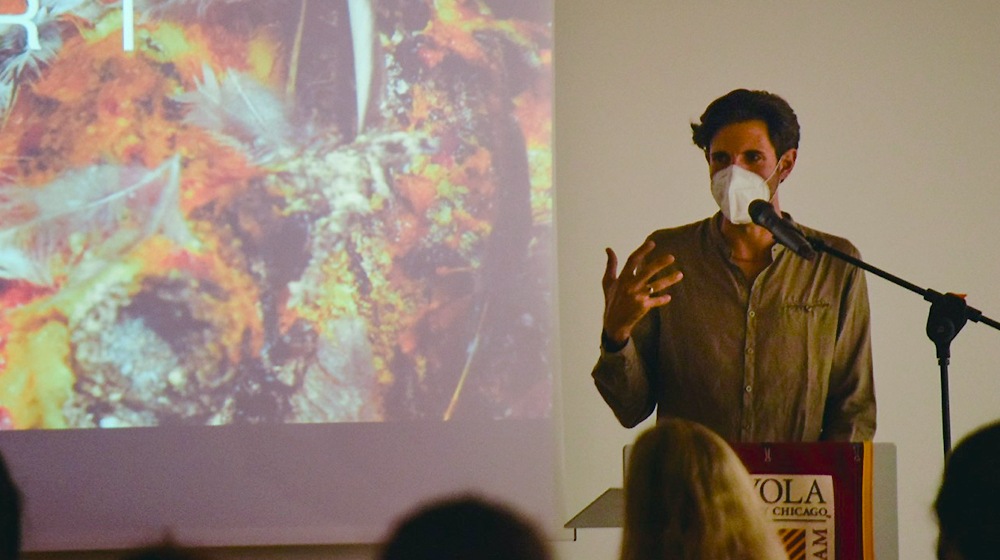
Human Rights
A Lens Towards Social Justice
Award-winning photojournalist Francesco Bellina delivers Human Rights Night keynote address.
Read MoreReturning to the homeland
I am a son of Poland. In the early part of the 20th century, my grandparents immigrated to East St. Louis, Illinois from Poland so I was raised in Polish culture and traditions. As a Rome Center student in 1973, I naturally gravitated to participate in the study tour to the Soviet Union and Poland in the spring of 1974. On that 17-day journey, I was able to identify and spend a day with my father’s first cousin and his family. This would be the first of more than 25 trips to Poland.
Into the 1980s, as Poland entered a dark and difficult period, I lost touch with my native land: I married, had children and started a law practice.
However, in early 2005 – Poland now a free and democratic nation – I was selected as a Visiting Professor of Law at Nicolaus Copernicus University (NCU) School of Law and Administration in Torun for the fall of 2006. Shortly after, my son Joe decided to spend the year at the JFRC. A couple years earlier, I had reconnected with the Rome Center’s founder John Felice and began to think about a way to connect my future Polish students with JFRC students for a mutually beneficial experience.

Study tour group from October 2022, with John Kurowski (second from right), his cousin Andrzej Kurowski (far right)
Birth of the JFRC study trip to Poland
As a lawyer for almost 30 years, I had seen and done so much that my interests went far beyond my civil litigation practice. That summer I had spent a week in a seminar on human rights in a just society at the Aspen Institute. I had always had a keen interest in government, politics and social justice issues. By a stroke of luck, my sponsors at Copernicus were the leadership of the faculty for Human Rights at the law school. They quickly embraced my idea of American students coming to Torun at their Thanksgiving break and suggested a human rights related program. The JFRC did as well, and 11 students (including son Joe and two sons of my JFRC classmates) joined my 32 students.

Kurowski gives lecture in Torun during Study Trip 2015
I returned from my seven weeks in Poland pleased with my experience, including the time I had shared with JFRC students and my students. I was surprised in March 2007, when Todd Waller, then JFRC Dean of Students and Human Rights instructor, called me and asked if I would be willing to repeat the trip for JFRC students at their fall break and expand the content. The rest is history.
Trip grows and students meet with activists, scholars and lawyers
Twelve programs followed between 2007 and 2018, with my Polish colleagues always offering great resources and planning. Dr. Waller usually assisted with the planning and often came along. We tackled some compelling subjects: Human trafficking; the twentieth anniversary of the Rwanda genocide, crimes against humanity and the international justice system; and women’s’ right in a just society.
Peter J. Schraeder, Dean College of Arts and Sciences, with students during Study Trip 2022
Students heard from both scholars and activists including: a woman who ran a shelter for victims of human trafficking in Romania; a Seventh Day Adventist minister who was the only American who stayed behind during the Rwanda genocide; an Afghan refugee who made the dangerous trek across several Middle Eastern countries to find his way to freedom in Italy. We also conducted mock asylum trials and heard of the unearthing of human atrocities by courageous Human Rights Watch researchers.
In 2010, JFRC Director Emilio Iodice expanded the program to include a weeklong stay in Poland to experience more of its dramatic history including the Holocaust and WWII. I consistently told our students that post-1989 Poland was a “great story” and how Poland was enjoying the longest period of peace in its 1000-year history.
Russia’s invasion of Ukraine on February 24, 2022 changed all that.
Human rights scope focuses on war in Ukraine
While vetting topics for the return of the symposium after a three-year COVID hiatus it quickly became clear that the war in the Ukraine must be our focus. Over one million refugees were now streaming across the Polish border. Russian rockets and artillery were devastating Ukrainian cities. The southern port city of Mariupol was being destroyed reminiscent of Warsaw in World War II. Stories of atrocities were emerging from places like Bucha and Irpin. Although the Ukrainians had begun to have some success repelling the invasion there was no end in sight for the war. To enhance the planning I decided to travel to Poland in May, 2022 to see and touch many of the participants.
When we began planning, we thought there would be refugee camps throughout Poland and other countries. There was none. The response of Poles to their Ukrainian neighbors was overwhelming. People stayed in homes and various shelters. Poland became one big NGO, helping to find the way for Ukrainian refugees.

Kurowski with Judge Tetyana Antsupova (middle) and NCU law professor Julia Kapelanska (right) in 2022
I visited two humanitarian relief centers in Torun. I spoke to Tatiana Dembska, a Ukrainian living in Poland about her efforts to feed and save people. I visited and spoke to Ukrainian children at an orphanage in Warsaw. I visited the Camillian Fathers sanctuary in Warsaw where they were housing over 30 Ukrainian women and children. I heard the story of a young Ukrainian mother of two, Marika Gvagvaliia, about how she made the difficult decision to leave her homeland and Kyiv, while her husband remained. I was able to spend time with my friend, Polish journalist Maciej Wierzynski and his wife Ewa in Warsaw.
I met and connected with Ukrainian Supreme Court Justice, Tetyana Antsupova of Kyiv through my colleagues at Copernicus. Like me, she had spent time as a Visiting Professor there. Born in Mariupol she left there to attend law school at the University of Odesa where she later became a leading human rights professor until she became a judge in 2017. She also made the difficult decision to flee the shelling and bombing. She traveled by car from Kyiv to Torun with her 15 year old son in the dead of winter, sleeping in their car in the cold and battling fuel shortages. Until recently she has been going back and forth to Kyiv to perform her judicial duties. I was very curious about her home town of Mariupol and the fate of relatives and friends there given the devastation. She told me, “…Some have escaped. Some remain. Some have died. Some have been taken against their will to Russia.”
A 'different' symposium
Gvagvaliia, Dempska and Antsupova all agreed to speak at the symposium. They all quickly captured the undivided attention of the participants. Each of them demonstrated the continuing unflinching drive of the Ukrainian people to overcome this war.
This symposium was different. We were able to touch and feel the human impact of an unjust war and its human devastation. It affected me personally. The thoughts of one of the Chicago students attending captured my feelings about this program and I suspect that of many others, “This once-in-a-lifetime experience is certainly a highlight in my time [as a Loyola undergraduate student] and is a memory I will hold near to me for my entire life.”

